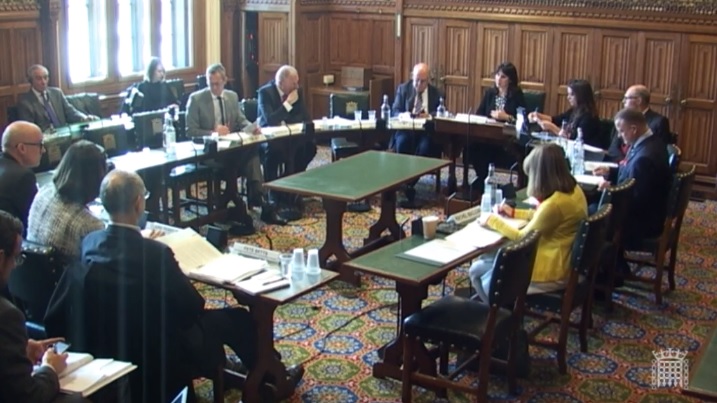Climate change minister Claire Perry has said she would be “personally disappointed” if the UK used ‘flexibilities’ to fill the shortfall in meeting the fourth and fifth carbon budgets identified in her own Clean Growth Strategy (CGS).
The MP for Devizes was grilled yesterday (28 November) by the business, energy and industrial strategy (BEIS) select committee in a wide ranging session, in which the minister also revealed she had never had an official meeting with prime minister Theresa May to discuss the climate change brief.
Questioning the minister as a result of “real concerns” on the potential use of such flexibilities, committee chair Rachel Reeves pointed out that the CGS fails to meet the fifth carbon budget and therefore its core aim.
When it was published, the strategy admits that the government expects to fall short of its ambitions, with emissions remaining 6% and 9.7% above budget in 2027 and 2032 respectively.
Perry stated previously that flexibilities – such as the use of over performance in meeting previous and future budgets or the purchase of international carbon credits from other countries – could be used to make up the shortfall.
“The committee does have real concerns about using those [flexibilities]. As ambitious as it [CGS] is, it doesn’t get us there. We need to do more if we are going to meet the targets we’ve set ourselves,” Reeves said.
When asked how she would feel if the government had to resort to using the fall back option, Perry said: “Given the level of ambition and given the level of progress I would be personally disappointed if we had to use them.”
However, she added that additional policies would be added to her efforts in the future to make up the underperformance of the CGS such as building regulations. These are currently caught up in the Hackett Review following the Grenfell Tower tragedy and Perry said the emissions reductions from this policy area and others yet to be brought forward could not be quantified yet.
The £2.5 billion recently announced for research and development will also, the minister said, provide a pathway for low carbon technologies to come forward and help deploy new carbon reduction techniques more cost effectively.
Perry also defended the level of achievement set out by the CGS in response to criticism that the document has proved insufficient to meet the budgets.
“In the real world that we all actually live in, if I said to someone that we were 93% towards meeting a target in 15 years’ time I think most people would think…we would probably hit it.
“I agree it’s not 100% there but it’s 93% of the way there in 15 years’ time, and I think that’s a pretty strong sense that we will make those budgets,” she said.
In a bizarre exchange with Reeves, the minister claimed “93% odds of meeting something 10 years out is pretty good odds”, prompting the BEIS committee chair to remind Perry that the plans get the UK the majority of the way to the targets, not that there is the same percentage chance of meeting them.
In response, Perry clarified: “I think we’ve got a 100% chance of meeting our targets…based on domestic policy action without using flexibilities but I agree to clarify, based on the budgets, our analysis of ten and 15 years out, we achieve 93 and 94% of the level we need to get to.”
“I am comfortable with the targets, this set of policies and proposals we’ve brought forward which are both concrete and commitments to deliver further down the future I think is the most comprehensive set of decarbonisation activities ever any government in the world is undertaking today because it works right across the UK,” she added.
Perry was also questioned on the ability of her and her team to implement the policies of the CGS across government now that climate change is no longer represented by a cabinet position following the closure of the Department for Energy and Climate Change (DECC).
Addressing the minister, Labour’s Peter Kyle said: “Now we have the CGS…this is the first really great test of your influence as a minister and as a team. This is why our committee is so keen to test out exactly how you’re going to deliver it because we see two things.
“We see a department with a diminished level of responsibility – it’s no longer led by a cabinet post and having its own department – and the weight of your responsibility being increased because you have to influence other departments who are delivering parts of your strategy.”
In the following exchange in which the minister was asked if she had met with the prime minister to discuss her brief, Perry repeatedly implied she had before clarifying that it was rather Theresa May’s team she had met with.
Remarking that Perry was being “slightly slippery” Kyle pressed her for details of an official, minuted meeting with May to discuss the climate change brief to which Perry replied: “Have I met with the PM with officials there to discuss this brief? No. Have I met with the PM’s policy advisor and chief of staff to discuss this brief? Yes. Did the PM see this document and approve it before it was published? Yes.”
However, she added that placing the responsibilities of DECC into a bigger department had “enhanced the ability of this country to lead on the clean growth agenda.”





